
The Victorian era saw revolutionary progress in three major areas: industry, military, and politics. The rise of automation and free enterprise brought about the promise of immense material wealth for anyone willing and able to put in the work. Military technology - on land, at sea, and eventually even in the air - progressed so rapidly it could render a nation’s centuries-old doctrines obsolete overnight. And along with these material changes came a fundamental reorganisation of the societies themselves - sometimes by redistributing power from the ancient noble regimes to benefit the common people, and at other times by reigning such democracies in through entirely novel power structures made up of bureaucrats, business magnates, or populist autocratic strongmen.
These three revolutions are represented in Victoria 3 through three distinct tech trees: Production, Military, and Society. Within each tree, the many technologies your country will discover through each game are organised such that each tech both requires one or several others and leads to one or several others. Modders might be interested to know that each tree automatically rebuilds and reorganises itself whenever changes are made, to make it pain-free to add, remove, or change the tech trees without having to tinker with tree layout or static image files.
To research Shaft Mining, which permits the construction of mining industries, you need both Enclosure (which permits private ownership of land) and Manufactories (which lets you establish basic industries that make finished products). Shaft Mining itself leads to Prospecting (which increases your chance of discovering new resources), Steelworking (which lets you build Steel Mills), and the Atmospheric Engine, a building-sized early steam engine employed to pump water out of mine shafts. Industrialised countries start the game with most or all of these technologies.
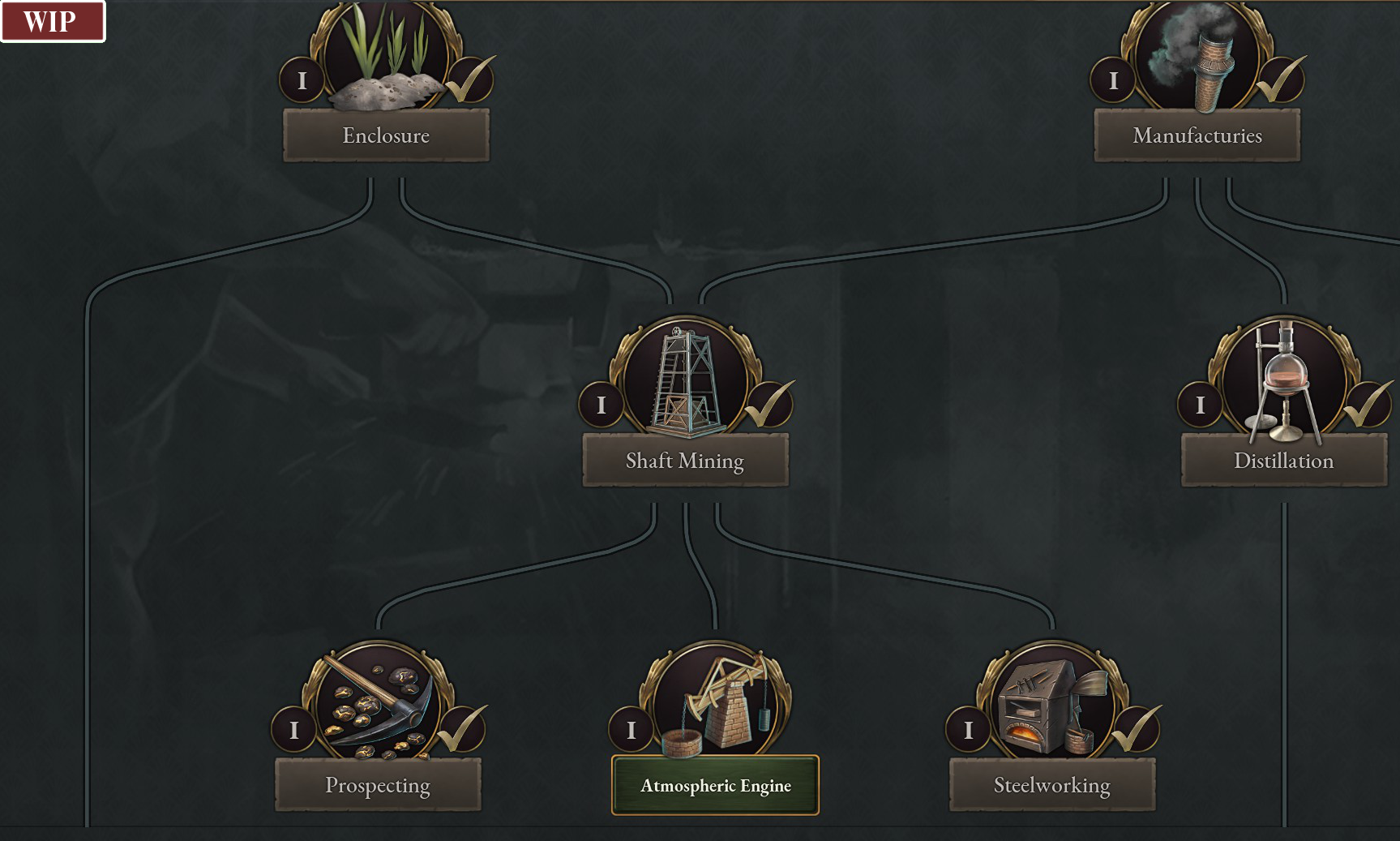
Production technologies are all about increasing your economic capacity in various ways. These tend to be very concrete inventions, such as Cotton Gin which increases the output of Cotton Plantations and Dynamite which can be employed for increased yields in all kinds of Mines. On some occasions they are more abstract, such as Enclosure which is a prerequisite for construction of modern, privately owned farms and ranches or Shift Work which more effectively utilises labor in your manufacturing industries. Production technologies also include advances to Railways, and some even unlock Goods unknown at the start of the game such as Rubber, Electricity, and Automobiles.
Military technologies improve your army and navy. These consist of a mix of new weapon technologies, doctrines, and ways of organising your Servicemen and Officers. Rifling lets you switch Production Methods from Muskets to Rifles in your Arms Industries, increasing their Small Arms production. Trench Infantry, once employed in your Barracks, organises your Battalions for trench warfare, which requires greater access to Small Arms but establishes a more reliable supply of manpower and causes fewer provinces to be lost when territory must be yielded to the enemy. The naval part of the tree is mostly dedicated to the invention of new ship types, but also includes a few new naval strategies that unlock or improve the effectiveness of certain naval Orders as well as upgrades to civilian Ports to improve your Supply Network and trade capacity.
Society technologies are all about new ideas for organising society. These include ideas pertaining to politics, finance, and diplomacy to name a few. Democracy permits the enactment of various voting franchise Laws as well as Republican principles of governing. Pan-Nationalism is a requirement for forming certain larger countries, and leads to Political Agitation which both makes your population more politically active and also gives you more Authority to deal with them. Several political ideas in this tree also unlocks specific Ideologies which may appear from that point on alongside new Interest Group Leaders and shake up the political landscape you had so carefully tuned, such as Feminism and Anarchism. Just as techs in the Production tree often unlock Production Methods, Society techs often unlock Laws - or Ideologies that can lend support for Laws previously thought utterly absurd by the political establishment.
In addition, Society technologies include improvements to your country’s financial system, such as Central Banking which increases your capacity for minting new currency and unlocks the Diplomatic Actions to Bankroll a country or Take on their Debt, as well as new forms of Institutions like Central Archives that unlock the Secret Police Law / Institution and leads to Identification Documents.
We are aiming for roundabout 175 of these technologies in the game on release, split up across the three trees. Many countries will start with 20-30 of these technologies already researched, as their starting economies, legal systems, militaries, and diplomatic relations rely on them. On average, leading edge countries will discover perhaps one new technology per year, though this pace can vary greatly from country to country.
An early part of the Society tech tree that deals mostly with finance and diplomacy. While a pre-industrial country might want to prioritise crucial Production technologies, missing out on elementary Society ideas that let you adjust Relations or perform effective International Trade is inadvisable. A rapidly developing country without allies could easily fall under the influence of an ambitious Great Power.
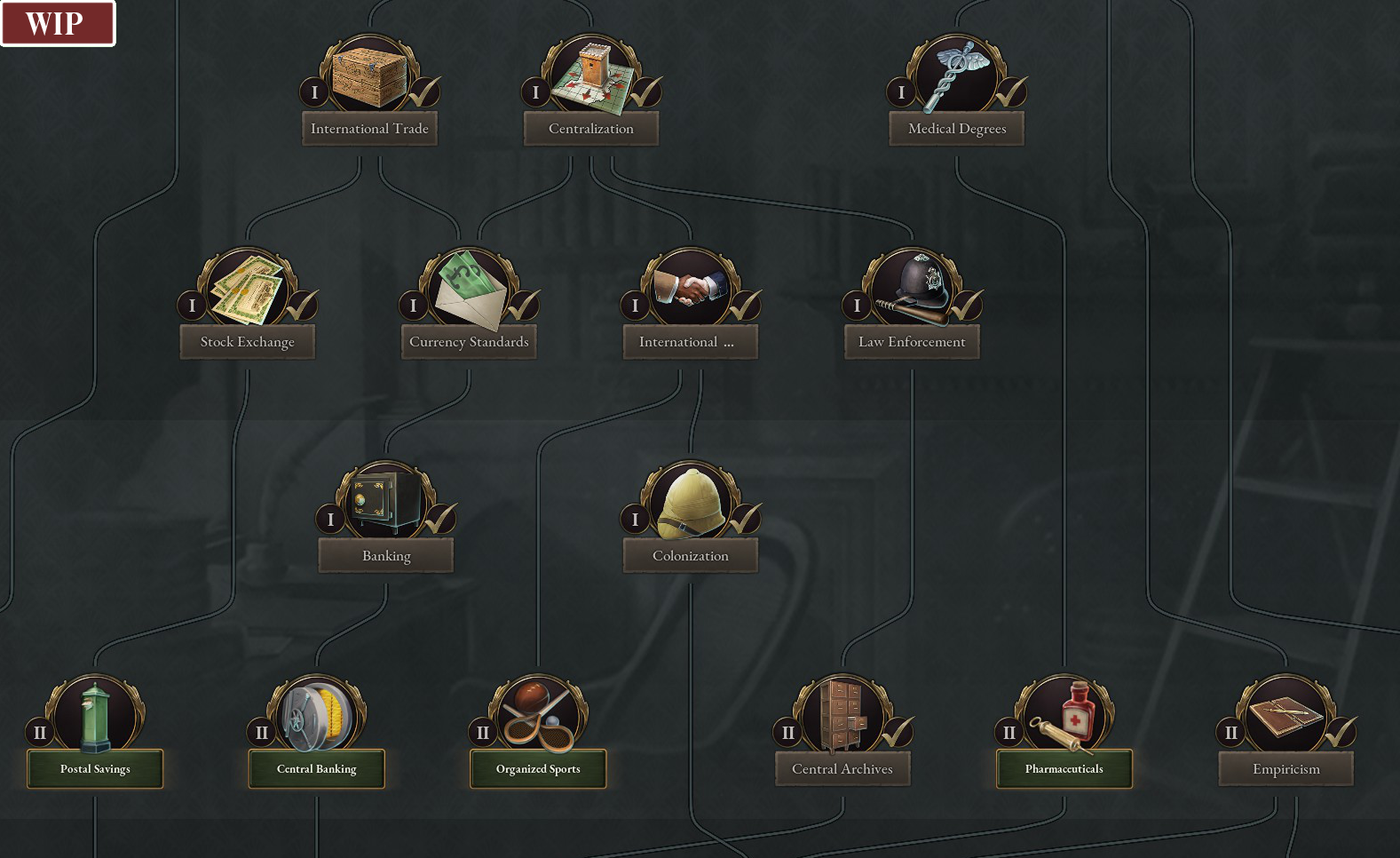

Embarking on the research of a new technology is a simple matter of clicking on the tech in the tree you’d like to focus on, and time will take care of the rest. But time is perhaps your most precious resource in Victoria 3, since falling behind your neighbours could be a death sentence - or at least might force you to cede your right to self-determination. The pace at which your research progresses is therefore of the utmost importance.
The rate by which countries develop new technologies is measured by Innovation. All countries start with a small amount of Innovation capacity. Those countries who can afford to do so can construct and fund University buildings, which employ Academics and Clerks to boost Innovation and thereby speed up the pace at which a country discovers new things.
Another way to improve research speed is to ensure the Industrialists, Armed Forces, or Intelligentsia are satisfied with the state of the country, as this will cause the effective cost of Production, Military, and Society techs respectively to drop. If only one of these groups are pleased with the society you’ve built, this will incentivize focusing your research on that tree since it’s relatively advantageous. As a result, a country with a large army and Laws favouring Patriotic, Loyalist, and Jingoist Ideologies would also progress faster in their Military technologies, though they may fall behind on Production and Society.
The amount of Innovation you can use to actively research your chosen technology is capped by your country’s Literacy. Even if your Universities are top-notch, your country’s ability to effectively incorporate new learnings will be hampered by a poorly educated population. Those countries who aim to be the guiding light of global progress must maintain a solid primary school system in addition to Universities that carry out their research.
Mexico is evidently on the fast-track of becoming the innovative powerhouse in the Americas, but its current Literacy rate doesn’t quite support making full directed use of the Universities they’ve built - for now.
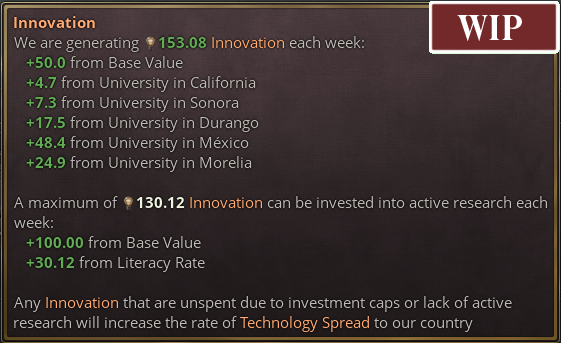
Literacy is a product of a Pop’s Education Access. If a given Pop has 30% Education Access, over time 30% of individuals in that Pop will become Literate. The pace by which this value changes is dependent on the birth- and death rate of the Pop, since this sort of learning happens mostly in the early years. 
A Pop’s Wealth provides it with a base level of Education Access, and Wealth often varies substantially depending on Profession, making higher-paid Professions have greater Education Access. However, Literacy is often a limiting factor to a Pop’s ability to Qualify for those jobs in the first place, so relying solely on Wealth for Education Access could severely limit your country’s social mobility and opportunity for economic growth. This is where your school system comes in.
The main source of Education Access comes from the Education Institution, which must be established by a Law and can be run by either the religious authorities, the private sector, or by a public administration depending on your school system Law. Each of these systems have their advantages: a religious school system keeps your priesthood strong and helps ensure unity of faith; a private school system works just peachy for Pops with high Wealth levels and ensures the working class don’t get strange ideas; and a public school system lets you enact mandatory schooling for children and encourages cultural assimilation.
A country’s Literacy is simply the percentage of their Pops in Incorporated states that know how to read and write at any given point. This means that if the most educated people in your society decide they’ve had enough and move abroad, your average Literacy will drop, to the benefit of the other country. If a war utterly devastates the backwaters of your nation and slaughters the hundreds of thousands you conscripted to defend it, your average Literacy might increase.
After the Texan Revolutionary War, these Clerks found themselves once again subjects of Mexico. While they currently all know how to read and write, their offspring are unlikely to enjoy the same benefits. Mexico has no formal school system in place and their Wealth doesn’t buy much of an education. To add insult to injury the Catholic Church Interest Group in Mexico is currently spreading Pious Fiction to ensure the children aren’t led astray by heretical ideas. The next generation of Clerks are unlikely to qualify to follow in their parents’ footsteps.
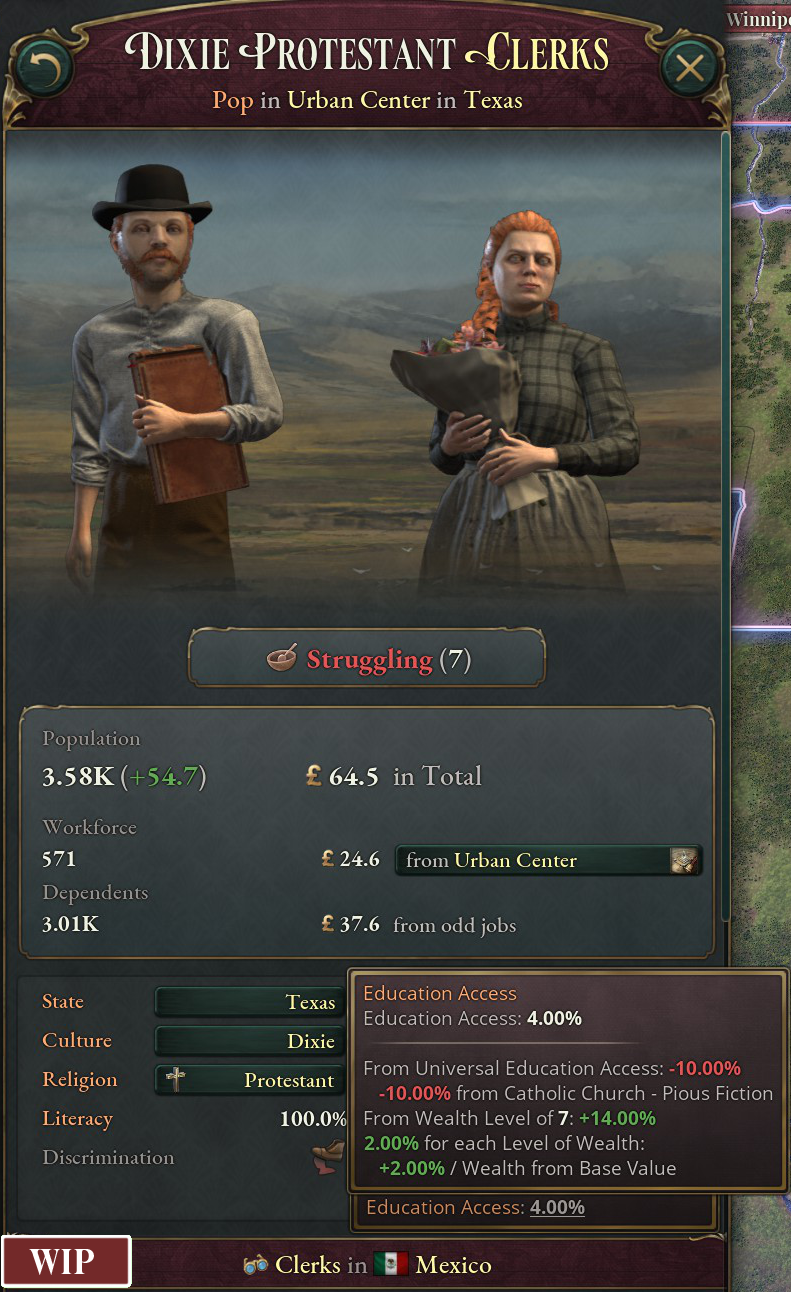
All technology is organised into Eras, which are rough estimates of progress through the game’s timespan. Anything in Era I is considered pre-1836 technology, going back as far as the very idea of Rationalism to the invention of Steelworking. Era II ranges from the start of the game to around the 1860s - Railways and Percussion Cap ammunition both belong here (though some countries did have railways a little earlier than 1836; this is not an exact science). Era III runs from the early 1860s to the end of the 1880s, and includes Civilizing Mission as a justification for colonisation and Pumpjacks, heralding the rise of the oil industry. Era IV from late 1880 to the early 20th century includes both War Propaganda and Film, both which might make it easier to justify the horrors which are to come in Era V - including Battleships, Chemical Warfare, and Stormtroopers. Era V also sees truly modern civilian inventions such as the Oil Turbine to make Electricity from Oil and Paved Roads to improve your national infrastructure.
The Eras act as an indicator of roughly where you are at in a given tree, but also serves a role in ensuring that rushing a certain late-game technology is difficult. Not only do technologies in later Eras take more innovative effort to research, but each technology you have not yet researched in that tree from previous Eras makes it harder and harder to make progress. This means techs aren’t unlocked on specific years in Victoria 3, and there is never a hard block preventing you from making your Universities develop technologies earlier than they were historically invented. But keep in mind that it’s a less efficient use of time and resources, so ensure that acquiring that technology ahead of everyone else is actually crucial for your strategy, as it will not come easily.
Trying to take a shortcut from the Atmospheric Engine (Era I) through Water-tube Boiler (II) and Rotary Valve Engine (III) straight to Combustion Engine (IV) so you’re able to manufacture Automobiles in the mid-1800s is certainly possible given enough money and grit, but would be far from the best use of your resources. Even skipping a few Era III Production techs before going for the Combustion Engine could easily yield this 30% time penalty, the difference which might buy you a whole Era III tech. Besides, you might want to research Rubber Mastication and set up a few Rubber Plantations before you start building Automobiles, unless you want your factories to be wholly dependent on foreign rubber for the tires...

The final yet crucial point about technological development is that government funding and steering of national research is not the dominant way most countries are exposed to new ideas. For each of the three categories of technology (Production, Military, and Society) there is always one technology that is spreading in your country. Which exact tech that spreads to you in each category is out of your hands, but it will always be something in your current technological Era which has already been invented elsewhere.
The speed by which technology spreads to you is highly dependent on your population’s Literacy. In addition, any Innovation you generate in excess of the Literacy cap is funnelled into improving tech spread rate. In other words, oversizing your Universities compared to your school system can assist in catching up to the rest of the world but can never be used to get ahead of the others.
Technology spread is also affected by your Freedom of Speech Laws. Stricter censorship provides you with more Authority but hinders the assimilation of new knowledge throughout your country. This is often to your detriment but could also very well be exactly what you intended! The downside of having a well-educated population is that they get exposed to foreign ideas more easily, and some of those ideas might not be what you had in mind. A bit more state control over what people are allowed to talk about can help keep your population focused on the ideas you want them to know about.
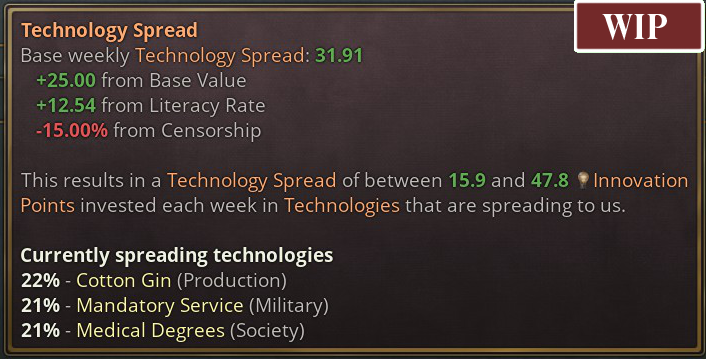
The technology system in Victoria 3 is meant to shape and change the game as your campaign evolves. While a few techs apply straight bonuses to various attributes of your country, the primary function of most techs is to unlock new actions, options, and even challenges. Very often, discovering a new technology doesn’t have any immediate effect on your country but gives you new ways to run your country and new tools in your toolbox. The introduction of new inventions and ideas can also act as a catalyst for emerging situations in your country, with certain parts of your populace demanding these new developments be adopted - or shunned. Much of this is driven by the Journal system which we will talk more about in a few weeks, but before that we will cover another feature of crucial importance to grand strategy games - Flags! See you next week!









